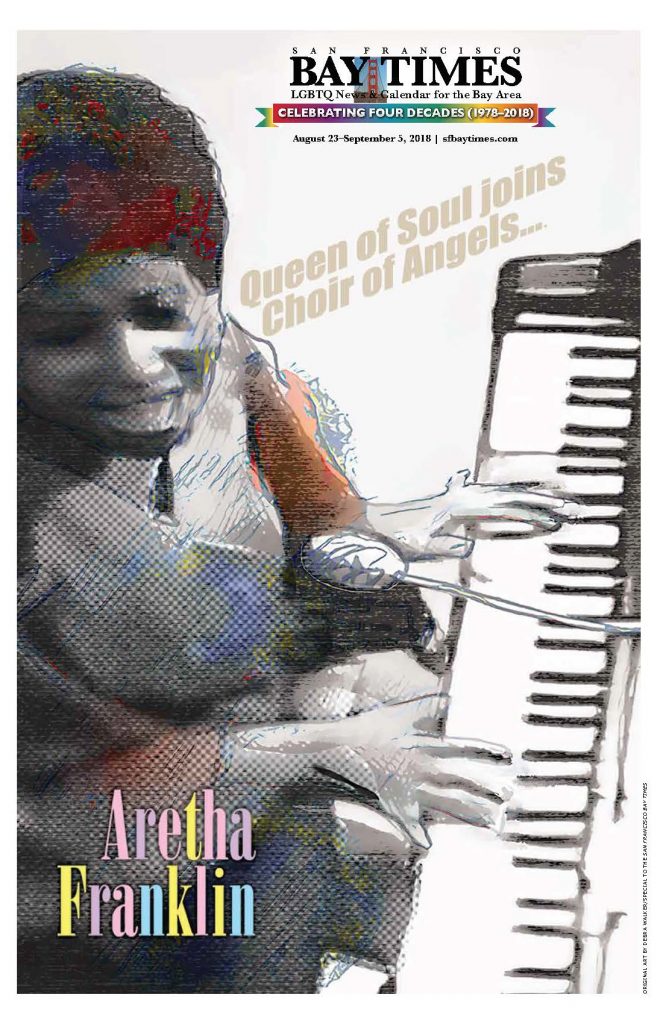The Legacy of Aretha Franklin Will Forever Thrive in the Castro and Beyond
Not long after the passing of Aretha Franklin (1942–2018) was announced on the morning of Thursday, August 16, her immortal legacy became evident in the Castro. We could hear her music flowing out of homes, cars and local businesses. People walking down the streets were talking about her and how she had touched their lives in meaningful ways. That night, a group of women musicians and singers including Dr. Dee Spencer of San Francisco State, Beach Blanket Babylon performer Renee Lubin and vocalist Deborah Coley performed Franklin’s songs in a heartfelt tribute at Beaux on Market Street. As Dr. Spencer told KTVU: “You feel her energy. It’s undeniable.”
Franklin’s energy is also felt on 7th Street in Oakland, where a plaque dedicated to her is part of the Walk of Fame located on the sidewalk in front of the West Oakland BART station (https://bartable.bart.gov/featured/stroll-walk-fame-west-oakland). Also honored are Etta James, Nat King Cole, Billie Holiday and local legends like Oakland’s own Samuel Saunders King.
You can feel her energy at SVN West at 10 South Van Ness Avenue, the former site of the historic Fillmore West music venue. There, in 1971, Franklin performed a three-night series of concerts that Rolling Stone now lists among the 50 greatest concerts of the last 50 years (https://www.rollingstone.com/music/music-lists/the-50-greatest-concerts-of-the-last-50-years-127062/the-jimi-hendrix-experience-worldwide-tour-127201/). We are grateful that video preserves at least one of these performances: https://www.youtube.com/watch?time_continue=388&v=Vyx34kgHGng
We are additionally grateful for Franklin’s lifelong support of the LGBT community. According to the book Respect: The Life of Aretha Franklin by David Ritz, her sister Carolyn was a lesbian. Her other sister Erma (1938–2002), concerning Carolyn (1944–1988), said to Ritz: “I consider her a great woman … . She went her own way, lived her own life, and found freedom in her individuality. She had no shame about her sexual preference and spoke the unvarnished truth.”
Carolyn—a talented musician in her own right—and Aretha collaborated on songs such as “Ain’t No Way” and “Baby, Baby, Baby,” which includes the line: “if loving you is so wrong, then I’m guilty of this crime.” Aretha went on to sing at same-sex marriages before they were legalized nationwide, to record with numerous well-known LGBT artists and to help fund support for AIDS research. Revealing of her generous nature, she held what was to be her last public performance at Elton John’s AIDS Foundation benefit in New York last November.
It is hard to imagine the LGBT rights movement, feminism and the ongoing overall struggle for civil rights without “Respect” and other Franklin anthems that are an enduring part of American history and our very souls. Those wishing to follow in her formidable footsteps would do well to consider the following: “Being the Queen is not all about singing, and being a diva is not all about singing,” she said. “It has much to do with your service to people. And your social contributions to your community and your civic contributions as well.”
ABOUT OUR COVER
 Artist, activist and San Francisco commissioner Debra Walker created this issue’s cover image honoring Aretha Franklin (March 25, 1942–August 16, 2018). Walker said, “As I was struggling though junior and high school, I relied on music—the music of such legends as Roy Orbison, Gene Pitney, The Beatles, Jefferson Airplane, Janis Joplin … but more so than any other, Aretha Franklin.
Artist, activist and San Francisco commissioner Debra Walker created this issue’s cover image honoring Aretha Franklin (March 25, 1942–August 16, 2018). Walker said, “As I was struggling though junior and high school, I relied on music—the music of such legends as Roy Orbison, Gene Pitney, The Beatles, Jefferson Airplane, Janis Joplin … but more so than any other, Aretha Franklin.
“Aretha’s influence wound its way into the music of every one of the rock and roll and pop artists topping the charts,” Walker continued. “But Aretha’s music touched the heart in much more tender and embracing ways, offering healing and love to tend to the unhealable heartaches of the teenage years. I will never forget the empowering words of ‘Respect,’ just as this young woman needed it to face the realities of the world.”
“Aretha soothed our souls as only the Queen of Soul could, bridging gospel and jazz and soul into the ‘Me Generation’ and the revolution of the Summer of Love, as if to make it real.” Walker then paused in reflection before repeating, “As if to make it real.”
Debra Walker: http://www.debrawalker.com/
The Official Aretha Franklin Site: http://www.arethafranklin.net/









Recent Comments